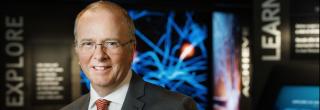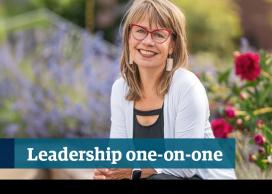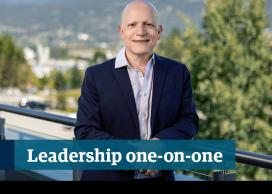Michael Coughtrie is Dean of the Faculty of Pharmaceutical Sciences. Born in Glasgow, Scotland, he began his professional teaching and research career in the School of Medicine at the University of Dundee. After 25 years of working in the medical field, he joined UBC in August 2013, and is currently serving his second term in this role.
Dean Coughtrie has extensive teaching experience, has received more than 70 competitive research grants and contracts, and is an accomplished scientist with over 200 publications. In September 2017, he was elected a Fellow of the Canadian Academy of Health Sciences.
Through his time as Dean, he has been a strong advocate for pharmacists and the profession of pharmacy. He fervently believes in the mutual respect between faculty and staff, and continues to work with provincial health authorities and the Ministry of Health to expand the Faculty’s reach and impact across the region.
Q1. What quality do you most admire in a leader?
MC: Honesty. You need to be able to trust your leaders and know that they’re being forthright. I also appreciate people who don’t take themselves too seriously.
Q2. What makes you laugh?
MC: There’s a British sitcom from the eighties called “Blackadder” – in my opinion, that’s probably the funniest bits of comic television ever written. The first two seasons, in particular, are outstanding. In many ways, Rowan Atkinson is a comic genius, especially in the time in which the series was created.
Q3. Who inspires you, and why?
MC: In my other life as a scientist, I was inspired by a Scottish professor and biomedical researcher called Geoffrey Dutton. He was a polymath and a professor in the same university in Dundee where I did my undergrad training. More importantly, he was a forerunner in his field and made a fundamental discovery of critical importance in drug and chemical metabolism – his work greatly inspired my career in science. I always looked up to him.
I also really value and enjoy working with the other deans here at UBC. They are a very strong collective of scholars and leaders. In 2013, when I first came to to the university, I found it to be a really welcoming environment. I also found was a wonderful group of people to learn from – the people here are not only fantastic, but also fun and inspiring.
Q4. For you, what makes UBC different?
MC: UBC feels very collaborative and it’s a place where people genuinely want to make a difference in their area of work. Another thing that stands out to me is the calibre of the staff at UBC – not only in our Faculty, but also across the organization. The staff here are outstanding and it’s a real strength of our university.
Q5. What is the most important lesson you’ve learned, in your career to date?
MC: Be prepared for things to take time. I’m not naturally a very patient person, but to be successful in a role like mine, you need a long-term vision, and the patience to see it through. You also need to recognize that things may never come to fruition – or if they do, they may not come to fruition during your tenure.
Q6. How do you like to recharge?
MC: Music is my passion. I’m a big fan of rock, prog-rock and metal. Opeth – a Swedish progressive metal/rock band is one of my favourites. Lately, I’ve also been listening to The Dust Coda, Gospel Beach and classics, like Zeppelin.
I also own (and play) a number of guitars; I’ve got an acoustic Larrivée, a Fender Telecaster, and my favourite, a Japanese-made Fender Stratocaster with blue flowers. I call it my ‘Marmite guitar’ because people either love it or hate it.
Q7. What is the best advice you were ever given?
MC: Don’t try to map out your career path too early, and don’t be afraid to say yes to new opportunities as they come up.
Q8. What do you value in your colleagues?
MC: Collegiality. Even in the virtual world, I think many people in Pharmaceutical Sciences still feel that we have a good atmosphere in our Faculty – where people are generally open, friendly, and respect each other.
Q9. What do you hope will be your lasting impact at UBC?
MC: I want people to know more about the amazing things that our students , faculty, and staff are doing, and so I’ve been focused on finding ways to improve our Faculty’s communications and marketing efforts, both internally and externally. I want to get the message out there loud and clear and often. Part of this also includes increasing interactions with our alumni.
Q10. If you could have a super power, what would it be?
MC: I’d like to be in two places at the same time. It would be great to be at work, while also visiting my family in the countryside in France. I’d rent a house with a pool, go down to the markets to shop, and enjoy my time in wine country.
Q11. Having recently celebrated the Faculty’s 75th anniversary, and looking back over your tenure, what are you most proud of, and what are your hopes for the future?
MC: I’m particularly proud of the work carried out by our Pharmacists Clinic. It’s pretty unique in that it delivers patient care, and therefore differentiates us from our peer institutions. This clinic must have seen upwards of 15,000+ patients over the past five years. It’s a place where new and innovative ways of practice can be developed, modeled, and tested, and where learners can experience the cutting edge of pharmacy practice.
Additionally, the relationship and work that we’re doing in partnership with the First Nations Health Authority has been significant for our Faculty. This partnership supports pharmacists who are working with, and in, First Nations communities.
And finally, there are also the pharmacists we’ve integrated into the Primary Care Networks program – a provincial initiative focused on team-based primary care across the province. We developed a proposal to bring 50 pharmacists into those primary care networks over the next couple of years. It has been a tremendous amount of work, but together with the Ministry of Health, and the various Health Authorities, we’ve made considerable progress. As we move into the future, it will inevitably have a massive impact on the health, and health outcomes of people in BC. This is something that has been in the works for many years and will continue to evolve well into the future. As a Faculty, this is something to be proud of.
Q12. What role does Pharmaceutical Sciences play in the fight against COVID-19? What are some of the ways in which the Faculty has contributed to combatting this pandemic?
MC: We’ve contributed a lot in the area of vaccinations – not just the vaccines themselves, but also the communications around vaccines and their benefits. We also train students to administer vaccines, and many of our Faculty are working non-stop in various clinics throughout the province.
We also loaned a lot of building space to Vancouver Coastal Health to set up another vaccination centre – which I hear is running very effectively! It’s great to be able to contribute to the effort in that way, among others.
Pharmacists play such a vital role in health care. I am particularly passionate about the role pharmacists play in serving rural, remote and underserved communities, and we have a number of initiatives in this sphere. The health disparities that exist in these difficult-to-reach parts of the province are well known – especially in First Nations communities. This is where there is potential and certainly room for us to grow.
Published: July 12, 2021
Interviewed by: Rivka Parris, UBC Internal Communications



